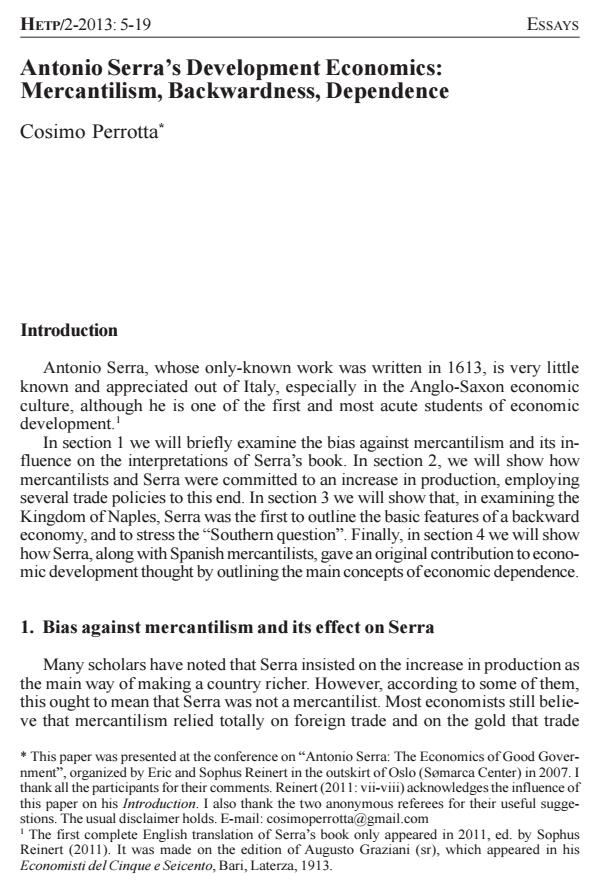Antonio Serra’s Development Economics: Mercantilism, Backwardness, Dependence
Journal title HISTORY OF ECONOMIC THOUGHT AND POLICY
Author/s Cosimo Perrotta
Publishing Year 2013 Issue 2013/2
Language English Pages 15 P. 5-19 File size 62 KB
DOI 10.3280/SPE2013-002001
DOI is like a bar code for intellectual property: to have more infomation
click here
Below, you can see the article first page
If you want to buy this article in PDF format, you can do it, following the instructions to buy download credits

FrancoAngeli is member of Publishers International Linking Association, Inc (PILA), a not-for-profit association which run the CrossRef service enabling links to and from online scholarly content.
Antonio Serra wrote in 1613 an outstanding analysis, on the economy of the Reign of Naples, which is still very little known out of Italy; where he is largely recognized as the founder of the "Southern question". This article proposes a larger view of Serra’s pioneering achievements, by putting him in the context of the mercantilist approach for development, and of the general analyses both of backwardness and dependence. We try to show that mercantilism was in fact committed to the increase in production, not to the increase in gold (as the enduring bias wants). In this sense Serra was fully a mercantilist. He was the first to analyze the general features of economic backwardness: lack of manufactures, absence of a stable government which encourages export, investments and trade; lack of entrepreneurial occasions; poorness of trade. Serra also - together with the Spanish mercantilists - introduced for the first time the analysis of dependence, i.e. of the process that makes a backward economy dependent on - and blocked by - the prevailing interests of stronger economies. Apart from a few authors, this was to be rediscovered only in the 1960s by the economics of development.
Keywords: Serra, mercantilism, development, dependence, backwardness
Jel codes: B11, B31, O10
- Political economy revisited: structures and objectives at the systemic level Ivano Cardinale, Roberto Scazzieri, in Economia Politica /2024 pp.153
DOI: 10.1007/s40888-024-00331-4 - Antonio Serra and the Economics of Good Government Cosimo Perrotta, pp.214 (ISBN:978-1-349-71199-4)
- The Economic Thought in the Counter-Reformation Age: Giovanni Botero and Antonio Serra Rosario Patalano, in OEconomia /2024 pp.39
DOI: 10.4000/oeconomia.16999
Cosimo Perrotta, Antonio Serra’s Development Economics: Mercantilism, Backwardness, Dependence in "HISTORY OF ECONOMIC THOUGHT AND POLICY" 2/2013, pp 5-19, DOI: 10.3280/SPE2013-002001